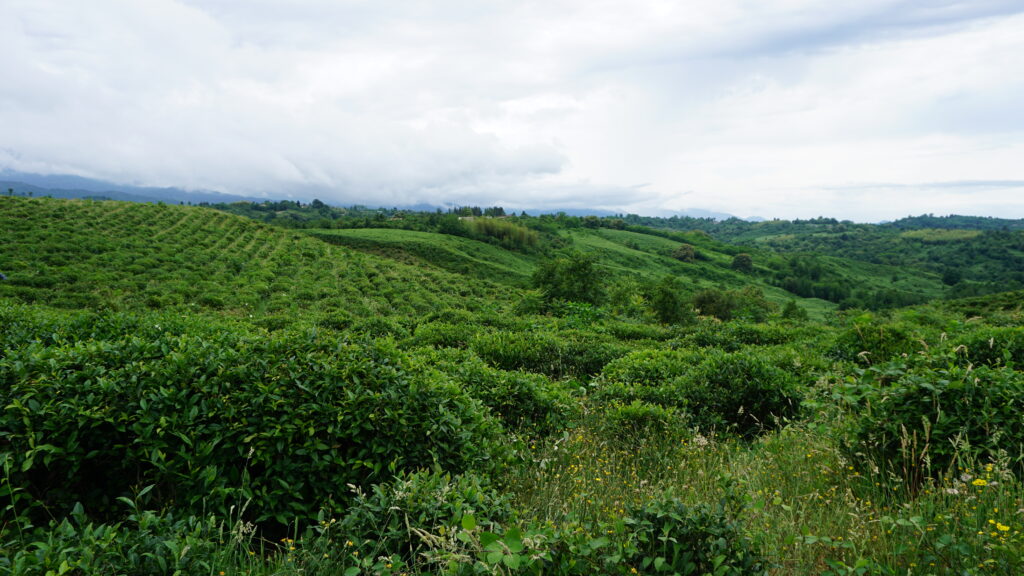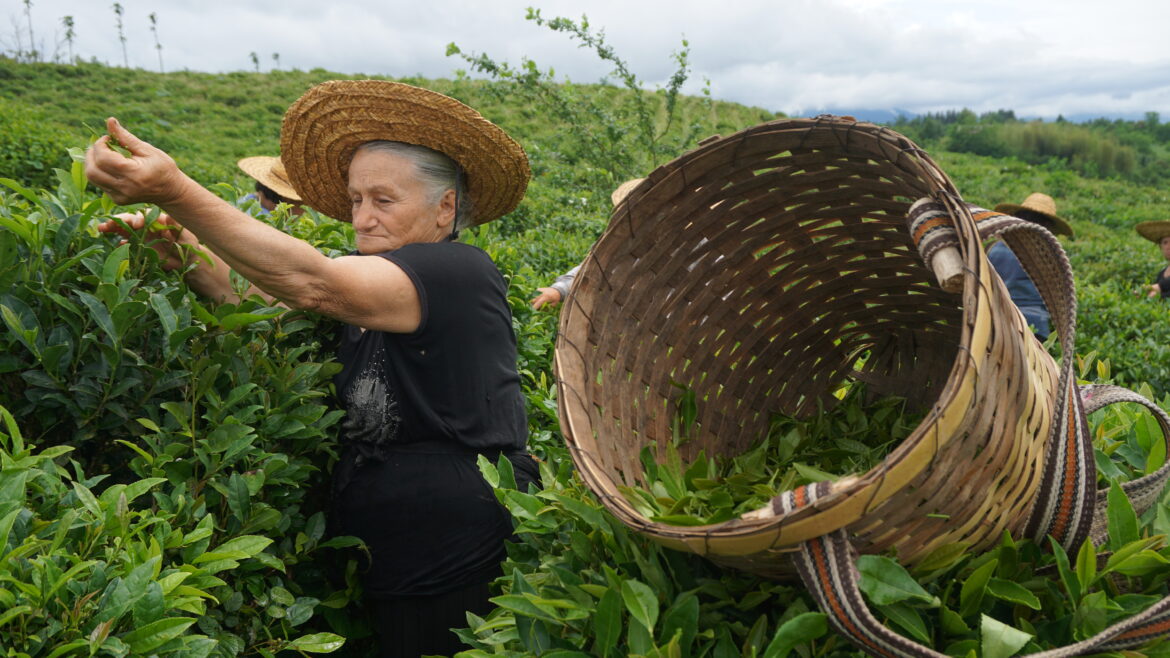In the serene landscapes of Western Georgia, amidst rolling green hills and snow-capped peaks, an unassuming revolution is brewing. Meet Georgie Styles, a passionate advocate for sustainable tea trade, and the mind behind the captivating journey from Georgia to the UK…
As we settle into the colder months here in the UK, many of us are reaching for the kettle – a tool of tradition that exemplifies Great Britain’s strong thirst for tea.
Yet despite our love for a hot brew, not many of us know where it comes from. Whilst the Camellia Sinensis (tea plant) is indeed native to China, South and Southeast Asia, it is in fact Kenya that is our largest tea trader, supplying over 40% of our UK tea needs, particularly black tea.
However in a world of climate breakdown, and in a country with a brewing count of over 165 million cups of tea a day – that’s 60 billion cups a year – is the revival of Georgia’s lost tea industry, the most northerly tea producer in the world, the answer to our search for a more sustainable cuppa?
A Growing Thirst for Sustainability
Set across a backdrop of rolling green hills and snowy peaks in the distance, straw hats bob along rows of tea bushes.
“I love working here very, very much” says Potola Dzneladze, an elderly tea picker giggling with her colleagues as she vigorously snaps leaves off the bushes and drops them in a woven basket draped over her back.
Potola has worked as a tea picker and grower for over 40 years, also tending to her own home tea garden in Ozurgeti – the capital of the Guria region of Western Georgia. This region is known across Georgia as the centre for tea thanks to its humid, subtropical climate and vast forested mountains.
As Potola speeds along lines of tea bushes, her well trained eye selecting the finest leaves with just a glance, she’s totally unaware that she is at the forefront of a brewing revolution which is set to serve the sustainability needs of the next generation.
As the world moves further into a state of climate emergency, we are becoming ever more conscious of our consumer footprint. Here in the UK, every three in four adults feel ‘very’ worried about the state of the climate, and almost 70% of 16-29 year olds. Resulting in the rise of ‘climate anxiety’ or ‘eco-anxiety’ – heightened emotional, mental or somatic distress in response to dangerous changes in the climate system.
This often goes hand in hand with changes in buying habits as a way to take control and ensure a positive impact on the world. A report by IPSOS on behalf of Yara International, shows that ‘58% of Europeans consider the climate impact important when buying food and beverages’ and another report by Kearney has revealed that by 2030, the majority of US consumers will be directed by the climate – consumer trends the UK is sure to follow.
With the rise of the climate-conscious eater and terms like ‘climavore’ and ‘locavore’ hitting the headlines in 2023, this year is set to mark a new wave of climate-focussed consumerism. So in an industry that is worth almost £1bn, what we choose to put in our mugs can have a big impact.
Georgia’s Tea History
Once amongst the finest tea producers of the world, Georgia, a country nestled between Turkey and Russia, is proud to have deep rooted tea traditions, resulting in an age-old tea obsession that almost matches that of the Brits.
Rich in biodiversity, agrarian heritage and folklore centred around food and drink, Georgia is home to over 8000 years of viticulture, 525 acknowledged indigenous grape varieties, 12 microclimates (ranging from subtropical to semi-desert) and 49 different varieties of arable volcanic soil. Never has a country prided itself on its food heritage and traditions so strongly, and who can blame them? After a long history of occupation and foreign invasion, food has been the saviour of their national identity through generations of displacement.
After the Georgian Prince, Miha Eristavi, started the first tea farms in the region of Guria in 1847, Georgia took centre stage as the most northerly tea producer in the world, igniting a strong reverence for ‘terroir’ or ‘the taste of place’ with every sip of Georgian produced tea.
However when Georgia was taken under USSR control in the 1930s, focus on the quality of tea production rapidly ended and shifted towards quantity. By the 1980s, Georgia was the fourth largest producer of tea in the world, supplying over 90% of the Soviet Union’s tea needs. Higher yields were achieved by the development of hybrid seeds, which impacted on taste and Georgia quickly lost one of its prized specialities. After the Soviet empire collapsed, Georgia sadly lost its tea production passion and most of their plantations went into disrepair.
A Brewing Revolution

Fast forward 30 years and there is a revival of Georgia’s lost tea industry, igniting a resurgence of high quality, Nature-driven tea production.
“I really enjoy working in the tea plantations again now, the quality is much better and I get to choose the quality of the tea I pick,” says Lamara, a 67 year old tea picker who studied tea technology at a Georgian university.
Lamara picks tea for some of Georgia’s 80 tea producers, now churning out 2,500 tonnes of tea whilst repairing their ancient plantations, upholding Nature and redefining quality. Producers are once again harvesting from wild plants, and slowly reviving plantations in line with Nature that have been left untouched for decades.
Geoflower – Georgia’s flagship of the regenerative tea revolution – brews up 100% Organic, FairWild certified, Single Estate mountain tea. Foraging Georgia’s bountiful natural resources, they blend wild roots, herbs, flowers and fruits to create unique flavours fit for increasingly climate-conscious consumers.
“Everybody should take climate responsibility on their shoulders, otherwise it’s not going to work. If you’re only counting how much profit [you have], it’s not going to work – [this is] our philosophy” says Gocha Dzneladze from Geoflower.
But not only is Georgia now reviving their tea traditions and plantations, they are now marrying their traditional folklore, foraging and drinks production techniques with the future of green technology to stay ahead of the curve in a competitive market.
Geoflower has developed innovative environmental credentials such as tea-drying ovens fuelled by waste hazelnut shells and achieving 90% of renewable energy from solar, reaching their net-zero emission goals sooner than 2030 targets.
This merging of tradition and environmental innovations, is the new face of Georgian tea.
The New Age Of Tea
Located on the fringes of the EU – and perhaps soon to be a new EU member state – Georgia has growing export potential across the EU and UK, which producers like Geoflower are keen to take advantage of.
So as the demand for sustainable, emissions-conscious production comes more rapidly than a change in our tastes, Georgia’s captivating tea-revival is well-placed to quench the thirst for shorter supply-chains and high quality, nature-driven products that the next generation of UK tea drinkers will happily sip on.




Comments are closed.